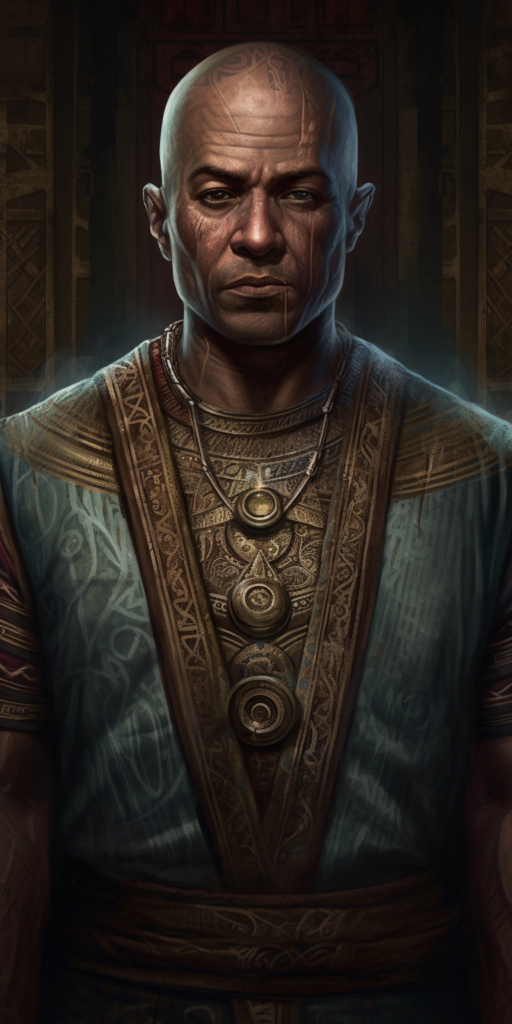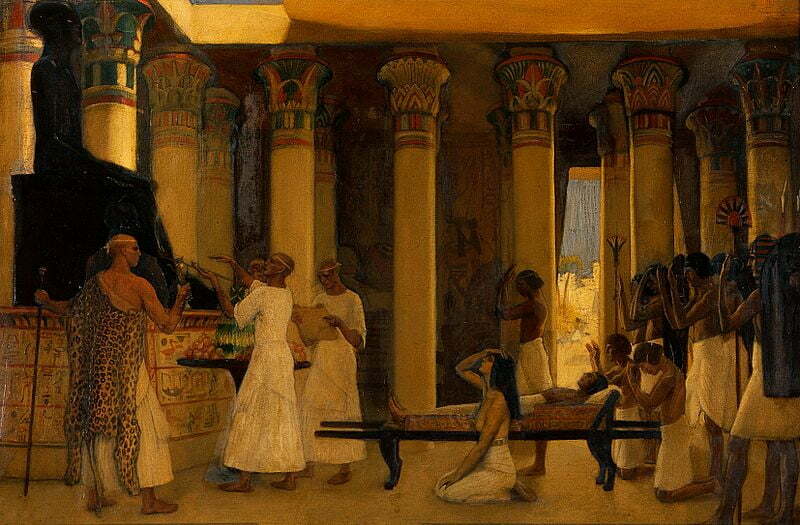Imhotep, God of Medicine and Wisdom
Imhotep is an ancient Egyptian polymath and a high priest of Ra, who is often referred to as the world’s first recorded architect and physician.

- Pantheon: Egyptian pantheon
- Deity Title: Imhotep, God of Medicine and Wisdom
- Deity Symbol: The ankh, the staff and the djed pillar
- Home Plane: The House of the Morning
- Deity Level: Lesser deity
- Alignment: Lawful neutral
- Aliases: Imouthes, Imhotpe, Imuti, and Ii-em-Hotep
- Superior: None
- Traditional Allies: Thoth, Anubis, Sekhmet
- Traditional Foes: Set, Apophis, and Apep
- Divine Artifact: The Staff of Imhotep
- Servants: The Imhotepans, a group of priests and healers dedicated to Imhotep
- Servitor Creatures: None specified
- Sacred Animal: None specified
- Manifestations: Healing touch, appearing as a kindly old man, and the creation of life-like statues
- Signs of Favor: A warm feeling in the chest, a feeling of being watched over, and a sudden insight into a medical problem
- Worshipers: Physicians, healers, scholars, and scribes
- Cleric Alignments: Lawful neutral, lawful good, neutral good
- Specialty Priests: Physicians, Surgeons, Scribes
- Holy Days: Festival of Imhotep (1st day of Thoth), Day of Healing (25th day of Thoth)
- Portfolio: Medicine, Healing, Wisdom, Writing, Architecture, and Astronomy
- Domains: Knowledge, Life, Light
- Favored Weapon: The staff
- Favored Class: Cleric
- Favored Race: Human
- Duties of the Priesthood: Tend to the sick and wounded, keep detailed medical records, write new medical texts, and create new architectural marvels.
- Major Cult/Temple Sites: The Temple of Imhotep in Memphis, the Imhotepan Library in Alexandria
- Benefits: Imhotep grants his followers divine powers of healing and medicine, as well as great wisdom and insight. Additionally, his followers are protected from diseases and are blessed with long life. Priests of Imhotep are respected members of society, and have access to the most advanced medical knowledge of their time.
Imhotep stands tall and regal, with a lean and muscular build that speaks of his disciplined lifestyle. His skin is a rich bronze, weathered by the sun and adorned with intricate tattoos that depict hieroglyphics and symbols of ancient knowledge. His head is cleanly shaven, save for a thin line of hair that runs down the center of his skull, and his piercing brown eyes are framed by sharp eyebrows and a prominent nose. His full lips are set in a contemplative expression, conveying both the weight of his responsibilities and the wisdom he has gained through his long life.
Imhotep’s clothing is simple but elegant, made of fine linen and woven with intricate patterns that reflect his status as a high priest. He wears a flowing white robe that drapes over his broad shoulders, cinched at the waist with a belt adorned with precious stones. His arms and legs are wrapped in bandages, both as a symbol of his devotion to the dead and as a practical means of protection from the harsh desert environment. Around his neck hangs a large amulet, etched with images of the gods and imbued with powerful magic that enhances his abilities.
As a deity, Imhotep is revered as the patron of healing and medicine, as well as the god of wisdom and knowledge. He is believed to have been a mortal man who rose to greatness through his exceptional talents and devotion to the gods, eventually ascending to divine status after his death. Imhotep is often depicted as a scribe, a builder, and a physician, emphasizing his multifaceted nature and his vast array of talents.
Throughout his life, Imhotep dedicated himself to the pursuit of knowledge, spending countless hours studying the texts of ancient wisdom and delving into the mysteries of the universe. He saw medicine as a means of serving the gods by easing the suffering of mortals, and he worked tirelessly to develop new treatments and remedies that could cure even the most stubborn of ailments. Imhotep was also a skilled architect, credited with designing some of the most impressive buildings and structures of his time, including the famous Step Pyramid of Djoser.
In his role as a deity, Imhotep is known for his unwavering dedication to his followers, and his willingness to share his knowledge and wisdom with those who seek it. He is a protector of the weak and a champion of justice, using his powers to heal the sick, comfort the grieving, and defend the innocent. Imhotep is an inspiration to those who value learning and discovery, and his legacy continues to be felt in the modern world through his enduring contributions to the fields of medicine, architecture, and philosophy.
Dogma
Imhotep’s key doctrine is that knowledge, science, and magic should be used to help humanity. While Thoth teaches the collection of knowledge for knowledges sake, and Anubis guards secrets of herbalism and magic, Imhotep insists that knowledge is only useful if it is used, and it must be used for the good of all. Though Imhotep is not a god of magic, his doctrine applies to magic as much as to the science of engineering. The appropriate use of magic is to help others, not harm them.
While not explicitly pacifistic, Imhotep places much more emphasis on healing than on warfare, in stark contrast to other Pharaonic deities.
Clergy and Temples
Imhotep’s clerics are generally peaceful healers who strive for the betterment of all humanity. Many dabble in the sciences, particularly architecture, and they often serve as the chief architects and engineers for the construction of temples to all the gods in the pantheon. These clerics are vastly popular among the common people, who rely on them for all varieties of healing. They wear the white robes common to most Pharaonic clergy, and shave their heads if they are male (which most are). Imhotep’s temples double as hospitals and centers of scientific learning.
| Imhotep | |
| Expert20 | |
| Medium-Size outsider | |
| Divine Rank | 1 |
| Hit Dice | 20d6+140 (260 hp) |
| Initiative | +7 |
| Speed | 60 ft. |
| AC | 26 (+7 Dexterity, +1 divine, +1 natural, +7 deflection) |
| Attacks | +3 speed disruption Quarterstaff (speed end) +25/+25/+20/+15 melee, +3 speed disruption Quarterstaff (disruption end) +25/+20 melee |
| Damage | +3 speed/disruption Quarterstaff 1d6+10 plus 1d6+6 |
| Face/Reach | 5 ft. by 5 ft./5 ft. |
| Special Attacks | Domain powers, salient divine abilities, spelllike abilities. |
| Special Qualities | Divine immunities, DR 36/+4, fire resistance 21, spontaneous casting of divine spells, understand, speak, and read all languages and speak directly to all beings within 1 mile, remote communication, godly realm, teleport without error at will, SR 33, divine aura (10 ft., DC 18). |
| Saves | Fort +14, Ref +14, Will +23. |
| Abilities | Strength 24, Dexterity 24, Constitution 24, Intelligence 43, Wisdom 31, Charisma 25. |
| Skills | Alchemy +27, Appraise +27, Craft (calligraphy) +40, Craft (sculpting) +27, Craft (stonemasonry) +40, Diplomacy +18, Disable Device +27, Heal +36, Knowledge (arcana) +27, Knowledge (architecture and engineering) +40, Knowledge (geography) +40, Knowledge (history) +40, Knowledge (local) +27, Knowledge (nature) +40, Knowledge (nobility and royalty) +40, Knowledge (the planes) +27, Knowledge (religion) +28, Listen +23, Open Lock +18, Profession (apothecary) +22, Profession (engineer) +36, Profession (herbalist) +22, Profession (scribe) +36, Spot +13. |
| Feats | Alertness, Ambidexterity, Improved Two-Weapon Fighting, Skill Focus (Profession [scribe]), Skill Focus (Profession [engineer]), Two-Weapon Fighting, Weapon Focus (Quarterstaff ). |
| Divine Immunities | Ability damage, ability drain, acid, cold, death effects, disease, disintegration, electricity, energy drain, mind-affecting effects, Paralysis, poison, sleep, stunning, transmutation. |
| Salient Divine Abilities | Gift of Life, Master Crafter. |
| Domain Powers | Cast conjuration (creation) spells at +1 caster level; cast healing spells at +1 caster level; cast divination spells at +1 caster level. |
| Spell-Like Abilities | Imhotep uses these abilities as an 11th-level caster, except for conjuration (creation) spells, divination spells, and healing spells, which he uses as a 12th level caster. The save DCs are 18 + spell level. animate rope, clairaudience/clairvoyance, cure critical wounds, cure light wounds, cure moderate wounds, cure serious wounds, detect secret doors, detect thoughts, discern location, divination, fabricate, find the path, foresight, hardening*,heal, healing circle, legend lore, major creation, mass heal, minor creation, prismatic sphere, regenerate, stone shape, true creation*, true resurrection, true seeing, wood shape. |

Other Divine Powers
As a demigod, Imhotep treats a 1 on an attack roll or saving throw normally and not as an automatic failure. He is immortal.
Senses: Imhotep can see, hear, touch, and smell at a distance of one mile. As a standard action, he can perceive anything within one mile of his worshipers, holy sites, objects, or any location where one of his titles or name was spoken in the last hour. He can extend his senses to up to two locations at once. He can block the sensing power of deities of his rank or lower at up to two remote locations at once for 1 hour.
Portfolio Sense: Imhotep instantly senses when at least one thousand people are involved in a project of construction, such as the building of a pyramid.
Automatic Actions: Imhotep can use Heal or any Craft, Profession, or Knowledge skill ‘even those he has no ranks in’ as a free action if the DC for the task is 15 or lower. He can perform up to two such free actions in a round.
Create Magic Items: As a god of crafting, Imhotep can create any magic item whose primary purpose is healing or building, such as a wand of cure moderate wounds, a periapt of proof against poison, or sovereign glue, as long as the item’s market price does not exceed 4,500 gp.
Imhotep is revered as a demigod of Wisdom, medicine and magic and is considered the patron of scribes (along with Thoth). The son of the god Ptah (god of crafts and intellect) and a human mother, Imhotep serves as an architect, astronomer, magician, philosopher, physician, poet, priest, sage, and scribe to the other gods and the great pharaohs who worship him. He designed the first large stone structures in Egypt including the Step Pyramid at Sakhara, which was the first of the great Egyptian pyramids.
Staff of Restoration
This thin and elegant dark wooden staff, its ends capped with bronze, is very light in weight and fragile in appearance. Though a poor choice for a melee weapon, its abilities make it a perfect instrument for dealing touch attacks. The Staff of Restoration is a +3 disruption/speed/spell storing weapon.
The Staff of Restoration has the following properties:
- Any spell or spell-like ability with a range of touch can be cast through the staff.
- The wielder gains a natural +4 bonus to Appraise , Craft, Decipher Script, Heal, Knowledge (any) and Use Magic Device checks.
- After possessing the staff for one day, all clothing and items on the person of the wielder are restored to brand new condition (cracks fuse, faded colors brighten, tattered cloth mends, etc.).
- The wielder can cast the following spells at will; erase, grease, and mending.
- lesser restoration 5/day.
- make whole 5/day.
- remove blindness/deafness or remove curse or remove disease 5/day.
- stone shape 5/day.
- greater restoration 2/day.
- regenerate 2/day.
All spells are equal in effect to those cast by a 20th level cleric.
Currently in the World

Imhotep is an ancient Egyptian god of wisdom and medicine, known for his intellect and cunning mind. He was created in the early days of the world, when the gods first emerged from the primordial chaos, and has since played an active role in shaping the course of human history.
In the early years of his existence, Imhotep devoted himself to studying the mysteries of the universe, exploring the secrets of magic and divination, and seeking to unravel the mysteries of life and death. He quickly became one of the most respected and powerful of the gods, revered for his vast knowledge and his ability to heal even the most grievous of wounds.
As the centuries passed, Imhotep became increasingly involved in the affairs of humanity, often taking on the role of advisor and mentor to the greatest rulers of the age. He played a pivotal role in the construction of the great pyramids of Egypt, using his knowledge of engineering and architecture to design the most magnificent structures ever built by mortal hands.
In the 1450s, Imhotep has turned his attention to the kingdoms of Europe, watching with interest as they struggle for power and supremacy. He has become particularly fascinated by the rise of the Ottoman Empire, a powerful new force that threatens to upset the balance of power in the region.
Imhotep sees in the Ottomans a chance to shape the course of history, and he has begun to work behind the scenes to ensure their success. He has been offering advice and guidance to the Ottoman leaders, using his vast intellect and cunning to outmaneuver their enemies and secure their dominance over the region.
But there are those who oppose Imhotep’s plans, and who seek to thwart his ambitions. Chief among these is the god Set, a jealous and treacherous deity, Set has been working tirelessly to undermine Imhotep’s plans, sowing discord and confusion wherever he can.
Despite these challenges, Imhotep remains resolute in his goals. He is determined to shape the course of human history, to guide it towards a future that he believes will be bright and prosperous. And as long as he has his intellect, his wisdom, and his cunning, he knows that he will succeed.

 Buy me a coffee
Buy me a coffee